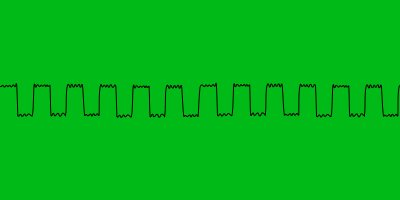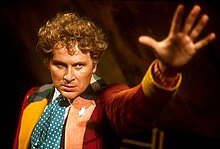Considering signal and noise in characterization in one of my tabletop RPG designs
In the comments to my post about the combat in Marvel Heroic Roleplaying, I said in reply to @clweeks:
I was skeptical of the no-chargen thing before I actually experienced the game, but I think a shared baseline understanding of the characters is an important part of the experience and using "established" characters really works for that. Conceptually, I think it makes the "my take on the character" thing read like signal rather than noise.
I wanted to expand on that “reads like signal rather than noise” thing a bit. To try to explain my metaphor, consider this waveform. From one point-of-view it looks like a square wave (maybe with some fuzzy noise on it), but from another point of view the square wave is irrelevant and it's the smoother waveform that's in view:

When you have an understanding of what to expect you can compensate for it so that you can appreciate the interesting variations in the thing you do care about. This doesn't only work for unidimensional signals, it works in art as well. Consider the movie O Brother, Where Art Thou?. It opens with a title card that says 'Based Upon “The Odyssey” by Homer'.
If the Coen brothers wanted to merely present a retelling of The Odyssey they could have done that, but by inserting this title card they present a reference point. Because of that reference point, for example, when you get to the scene with the sirens you don't think “who are these women and what are they doing here?”, you accept that this part of the movie will be an encounter with the sirens and you focus on the artistry of the scene itself. (Note that I'm not saying that plot logic is never important in a movie, just that that particular movie was focused on something else).
The idea of the performance aspect of characterization through the lens of Doctor Who
My in-development game Getting There in Time is based on the TV show Doctor Who (the classic version moreso than the modern reboot). In this show there's an interesting in-fiction element of characterization: The Doctor periodically regenerates to look and act differently (i.e. be played by a different actor) but is fundamentally the same person. There are two interesting aspects to this: the various incarnations play up or down different aspects of The Doctor's personality. For example, the much-maligned 6th Doctor, Colin Baker, leaned into the arrogance and mercurial nature that was always part of the character without coating in in the charm that many of the other actors brought to the role.

Naturally, while good actors bring something to the performance of a character, a lot of a character's personality is down to the writing, and since the writers of the show get a feel for what the actor brings to the role they tend to play off each other a bit. But with Doctor Who, even when they intentionally write for one incarnation it's not impossible to imagine another in the role. In fact, one of the “behind the scenes” stories from the special episode The Five Doctors, they say that most of the interaction with the Time Lords on Gallifrey was originally written with Tom Baker's 4th Doctor in mind. But when Tom Baker pulled out of the production this material was given (possibly with some minor rewrites) to then-current 5th Doctor Peter Davison and it doesn't come across as jarring or out-of-character, it's just The Doctor doing things The Doctor would do.
Trying to explore that in my game design
For my game, I didn't want the game to only work for people who are fans of the show. Furthermore, since it's not an officially licensed game but rather an homage to the idea of the show, I felt it was important to try to build a character system that strongly communicated the “core” of a character (for all of the characters, whether the recurring Chronomaster character, one of the pre-generated Companions, or a player-created Companion) so that the particulars of what a player was bringing to the roleplaying would be more “signal” than “noise” (and since the tone is light mystery or action this could be something as simple as the sense of humor they bring to the character, or their word choices when speaking, etc.). To do that each character is built of three traits, each of which are presented from two different angles – imagine holding a 3D object up in front of you and then cocking your head to the side to get another angle, that's the metaphorical equivalent of what I want people to do with these traits, by looking from two angles you see the shape of how the trait manifests in the particulars of this person.
For example, I have a pre-generated character that was inspired by Brigadier Lethbridge-Stewart, Colonel Bernard Huxley. Colonel Huxley is a Military Man, a Defender, and a Gentleman. From one angle you could say that being a Military Man makes him Determined, but from another you might say it makes him Rigid. From one POV, being a Defender makes him Courageous, but a different take would be that he's somewhat Parochial. As a Gentleman, someone who's positively inclined toward him would say that he's Proper, but others might say that he's Officious.
| Trait | Positive Aspect | Negative Aspect |
|---|---|---|
| Military Man | Determined | Rigid |
| Defender | Courageous | Parochial |
| Gentleman | Proper | Officious |
And during scenes when Colonel Huxley is in the spotlight, all of the players are supposed to be watching for when he does something that maps to one of his “cruxes”:
| Crux |
|---|
| When you employ military hardware |
| When you employ tactical or strategic thinking |
| When you make a tactful and courteous request of someone |
| When you give orders, take command, or whip people into shape |
| When you muddle through in an area beyond your depth |
| When you leap into danger to save someone |
Because a classic Doctor Who story is largely structured like a mystery where the sci-fi situation is gradually revealed as the characters poke around, and then the characters save the day, what the characters do is often somewhat pro forma (they're not going to let the baddies complete their evil plan, they're going to thwart it), but how they do it and what they're like while they do it is part of what makes the show special, and that's part of what I'm trying to get these mechanics to do.
The game hasn't functioned perfectly in playtesting, I haven't locked down whether that's due to some fundamental problems with the mechanics or whether the idea of the mechanics in my head wasn't successfully transmitted to the players and we just weren't all on the same page, but I think the character system is working pretty well. With two different groups I had players play Colonel Huxley who were unfamiliar with the source material that inspired him but both brought different things to the character that still had some common themes at the core (they also attached different backstories and visual imagery to the core: one player played him as a 70s-era British soldier who had seen some action in The Troubles in Northern Ireland, another was more like a Victorian era officer who had seen action in various colonies).
I think i understood most of that it was quite thick to wade into before i've had my coffee lol.
I think traits are the best I love putting traits on traits to give players more choices for replayability and player customisation.
Going back to the example of doctor who. Each doctor is unique while they are all the doctor they all have unique personalities and key pros and cons.
A way to pop that into a game would be to have
Class 'the doctor'
personality 'eccentric/excitable/goofy/intelligent'(using better terms)
specialisation 'fez - bonus to chance rolls'
weakness - 'trust - characters you meet have +2 conflict chance'
Things like personality and specialisation can also have negative effects to add complication and tough choices to character building. Assuming you work with pen and paper rpg it might be a little more standard for you but i generally build card games and when i'm doing character traits i tend to have a series of cards for each category so that the players can build an interesting character at the start. class, personality, specialisation, weakness would give great options and game exploration.